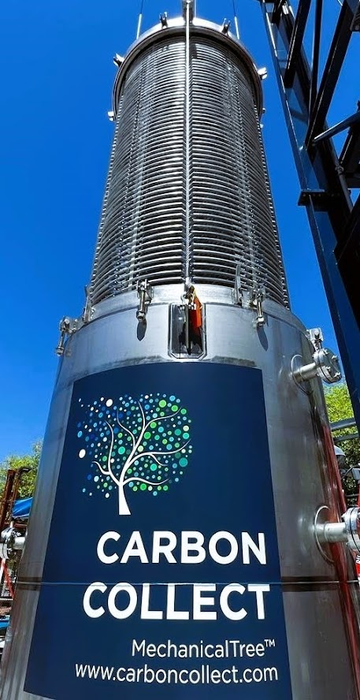In a major innovation in the fight against climate change, Carbon Collect Ltd. has developed a MechanicalTree™ which is primed to become a leading technology in the global drive to reduce carbon emissions. Incorporating research and innovations by Arizona State University engineering professor Klaus Lackner, and following a concentrated two-year design and engineering program, the first commercial scale MechanicalTree™ was unveiled this week by Carbon Collect on Arizona State University’s Tempe campus. Carbon Collect is incorporated in Ireland.

Credit: Photo courtesy Carbon Collect
In a major innovation in the fight against climate change, Carbon Collect Ltd. has developed a MechanicalTree™ which is primed to become a leading technology in the global drive to reduce carbon emissions. Incorporating research and innovations by Arizona State University engineering professor Klaus Lackner, and following a concentrated two-year design and engineering program, the first commercial scale MechanicalTree™ was unveiled this week by Carbon Collect on Arizona State University’s Tempe campus. Carbon Collect is incorporated in Ireland.
Carbon Collect’s MechanicalTree™ is up to a thousand times more efficient at removing CO2 from the air than a natural tree. The captured carbon from the Mechanical Tree™ can be sequestered or sold for re-use in a variety of applications including food and beverage, industry, agriculture and energy. Future research in emerging sectors such as synthetic fuels promise to expand the use cases for captured carbon.
Unlike other Direct Air Capture technologies, the MechanicalTree™ can remove CO2 from the atmosphere without the need to use blowers or fans. Instead, the technology uses natural wind to deliver air through the system. This makes it a passive, lower cost and scalable solution that is commercially viable. When deployed at scale, the technology could help curb the growing amount of greenhouse gases in the Earth’s atmosphere and help to combat the effects of global warming.
“We are delighted to launch our first commercial scale MechanicalTree™ at Arizona State University, which is a valuable partner in the development of our project. We believe we have developed a real and scalable solution to combat the effects of C02. Our goal now will be to accelerate the global climate effort and to contribute to reversing carbon emissions over the next decade and beyond. I would like to acknowledge the invaluable work on our project by Klaus Lackner and the ASU Center for Negative Carbon Emissions,” said Reyad Fezzani, Vice Chairman of Carbon Collect.
The MechanicalTree™ installed on the ASU campus represents a radical new geometry for direct air capture systems, a tall column and disks. If widely deployed, the tree could help alleviate carbon dioxide in the atmosphere. In operation, the MechanicalTree™ rises to a height of 33 feet (10 meters) to collect carbon from ambient air. Once loaded with carbon, the stack of discs will retract into the base unit and give up the carbon drawn from the air.
An engineering program was initiated by Carbon Collect in March 2020 at the start of the Covid-19 lockdown. In two years, the company has moved from concept to the first commercial scale MechanicalTree™. Carbon Collect and ASU are working with the U.S. Department of Energy to develop engineering blueprints for carbon farms in the United States.
“Carbon dioxide is a waste product we produce every time we drive our cars or turn on the lights in our homes,” Lackner said. “Carbon Collect’s MechanicalTree™ can recycle it, bringing it out of the atmosphere to either bury it or use it as an industrial gas.”
Carbon Collect is presently operating off its first funding round, with a focus on delivering the initial engineering program and launch of the first MechanicalTree™. The company intends to progress to a second funding round prior to the end of 2022, which will be a key preparatory step for scaling and executing its business plan.
Carbon Collect plans to scale the technology starting with a series of direct air capture carbon farms which will capture approximately 1,000 tons of CO2 per day, designs for which are being completed.
“Our passive process is the evolution of carbon-capture technology, which has the ability to be both economically and technologically viable at scale in a reasonably short time frame,” said Pól Ó Móráin, CEO of Carbon Collect Ltd.
Carbon Collect’s team comprises a group of leading business and technology executives, as well as experienced engineers and scientists. The company holds exclusive global rights to key innovations of Dr. Klaus Lackner at ASU, and the company licensed ASU’s designs invented by Dr. Lackner. The company then engineered and fabricated the MechanicalTree™ and continues to sponsor ongoing research on carbon removal at ASU. Arizona State University is one of a group of shareholders of Carbon Collect Ltd. The company is headquartered in Dublin, Ireland and has a wholly owned subsidiary, Carbon Collect Inc. in Delaware, United States. The Vice Chairman and Executive Director is US-based Reyad Fezzani, and the CEO, Pól Ó Móráin, is based in Europe.
Method of Research
News article
Subject of Research
Not applicable




